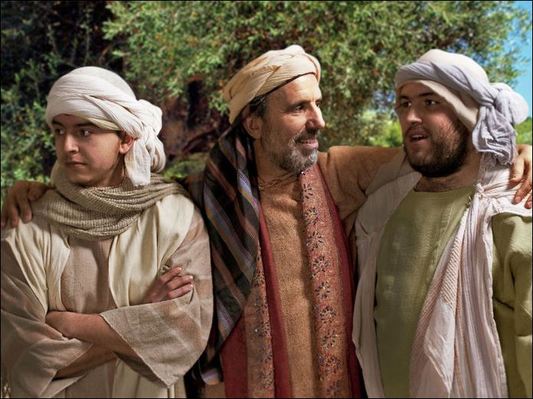“... There was a man who had two sons. He went to the first and said, ‘Son, go and work today in the vineyard.’ ‘I will not,’ he answered, but later he changed his mind and went. Then the father went to the other son and said the same thing. He answered, ‘I will, sir,’ but he did not go. Which of the two did what his father wanted? ” “The first,” they answered. Jesus said to them, ‘Truly I tell you, the tax collectors and the prostitutes are entering the kingdom of God ahead of you. For John came to you to show you the way of righteousness, and you did not believe him, but the tax collectors and the prostitutes did. And even after you saw this, you did not repent and believe him” (Matthew 21:28-32).
In this parable, which is somewhat similar to the parable of the Pharisee and the Tax Collector (Luke 18:9-14), Jesus uses the story of two sons to reprimand those who believed they were good people while not realizing that they were, in fact, self-righteous and not obedient at all. The parable makes a strong contrast between these people and those who were clearly sinners by background, yet who were now accepting the message of the Kingdom of God.
Psychologically the parable is an interesting one in that it is difficult to read it without naturally siding with those whom Jesus exonerated. Noone finds it easy or pleasant to put themselves in the shoes of those Jesus so clearly rebukes. Nevertheless, we can apply this in various areas of life – not least in terms of the “vineyard” (Matthew 20:1) against which he set the parable. Did we feel a call to do some good work which we accepted, yet which we have delayed or put aside? The story could apply to us in this or in many other ways.
And there is another way to approach this parable. Supposing we view ourselves as being both sons rather than just one of them. This approach fits well with the Christian understanding that our carnal human nature remains with us and has to be constantly struggled against, even when we have repented and received the Spirit of God (Romans 7:23-25). We live our lives, in that sense, as both sons on a daily basis – the son (or daughter) who struggles to accept what we come to see is right and finally makes the right decision, as well as the son or daughter who may accept what we must do at first, but does not follow through because we forget our decision or are tempted away from it. This approach fits the details of the story in a number of ways. Note the son who says “yes” at first seems to be respectful (he says “sir”) yet still fails, while the son who is rebellious (the first reaction of our own human nature is all too often wrong) is willing to finally turn and do what is right.
Jesus’ parable was clearly aimed at the apparently righteous Pharisaical individuals with whom he contrasted those who were rebellious yet finally obedient. Yet it can be helpful to put ourselves in both situations in order to remember how our own human nature works. Accepting the truth is not always easy and meditation on how this parable might apply to us in our own lives can help us to reach right decisions – to turn out to be the good son who even the Pharisees recognized was the son with whom God was able to work.
It’s a simple principle, but one that can help us to profit from a number of Christ's parables that contrast right and wrong responses.

 RSS Feed
RSS Feed
